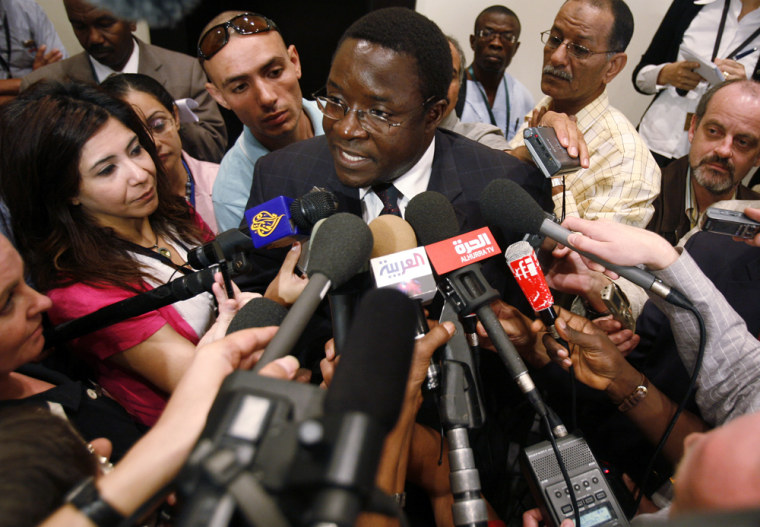African efforts to encourage a deal between Zimbabwe President Robert Mugabe and his opponents showed no results Tuesday, while Mugabe's spokesman defiantly said his boss has no plans to step down and told Western critics they can "go hang."
Zimbabwe's opposition also dampened hopes a coalition government might be negotiated, saying Mugabe had shut the door on talks by going ahead with last week's presidential runoff election that he won after a campaign tainted by brutal attacks on his political foes.
Some leaders at the African Union summit here had harsh words for Mugabe, producing sharp exchanges during closed-door meetings, participants said.
Vice President Mompati Merafhe of Botswana said Mugabe's government should not be recognized and Zimbabwe should be barred from AU gatherings. "The outcome of these elections does not confer legitimacy on the government of President Mugabe," Merafhe said, according to a statement released by his aides.
Officials from Liberia, Nigeria and Sierra Leone also criticized Mugabe, and Zimbabwe's leader responded, said Ismail Ndiye, a delegate from Senegal who was at the session.
"He had a lot to say," Ndiye said, but declined to give any details. An Egyptian Foreign Ministry spokesman, Hossam Zaki, said Mugabe spoke for a half hour and lashed out at some African countries who spoke out against him.
African nations divided
Mugabe's African peers are trying to persuade the 84-year-old leader to loosen his grip and share power with his top rival, Morgan Tsvangirai, who got the most votes among the four candidates who competed in the opening round of the presidential election March 29. Tsvangirai dropped out of the runoff with Mugabe because of killings and beatings of his supporters.
African nations are deeply divided, with many reluctant to put public pressure on Mugabe despite U.N. and Western calls for tough action.
On the final day of their summit Tuesday, AU leaders adopted a resolution calling for dialogue in Zimbabwe while not directly criticizing Mugabe or the runoff. The leaders said they were "deeply concerned" about the situation but their only promised action would be to support "the will" for a unity government.
Mugabe's spokesman, George Charamba, took a defiant tone, saying that while Zimbabwe's ruling party has offered dialogue with the opposition, it will not promise that anything "beyond that will emerge."
He insisted Mugabe — who was sworn in for his sixth term Sunday, a day before flying to the summit — would not give up the presidency.
"He's a few days into office and you expect him to retire, do you?" Charamba told reporters. "He has come here as president of Zimbabwe and he will go home as president of Zimbabwe, and when you visit Zimbabwe he will be there as the president of all the people of Zimbabwe."
Zimbabwe to West: 'Go hang'
Charamba dismissed growing criticism from Western governments, which are urging Africans to reject Zimbabwe's election and calling for U.N. sanctions. "They can go hang. They can go and hang a thousand times," Charamba said.
In Zimbabwe, the opposition Movement for Democratic Change also took a hard line. In a statement issued in the capital, Tendai Biti, a top MDC leader, dismissed speculation that his party and Mugabe's ZANU-PF were about to conclude an agreement to govern together.
"Nothing can be as malicious and as further from the truth," Biti said. "As a matter of fact, there are no talks or discussions taking place between the two parties and most importantly, there is no agreement in the offering."
At least some in the MDC were demanding that Mugabe leave office. "They lost the election. They must go," said a Biti aide, Nqobizitha Mlilo.
Many African leaders, including President Thabo Mbeki of South Africa, are unwilling to openly criticize Mugabe, who took power at Zimbabwe's independence in 1980 after leading the fight against white rule. They also don't want to be seen as backing former colonial rulers and others in the West against a fellow African.
Governing through violence
In Harare, Zimbabwe's capital, Tsvangirai left the Dutch Embassy on Tuesday after taking refuge there for nine days since announcing his withdrawal from the runoff.
But MDC spokesman Nqobizitha Mlilo said there were fears in Zimbabwe that opposition supporters and rights activists would now be subjected to a new crackdown because turnout for the presidential runoff was low.
"The only way they can continue to govern is through violence," he said of Mugabe's party.
The activist group Human Rights Watch says Mugabe supporters beat people who couldn't prove they voted, and four white farmers were reported hospitalized after being attacked by Mugabe loyalists Sunday. White farmers have often been targeted by Mugabe militants.
Humanitarian groups, meanwhile, warned that millions of Zimbabweans are at risk of hunger if the government does not lift its ban on aid agencies working in the country. The groups say the government has been funneling food aid mostly to Mugabe supporters since imposing the ban June 5.
The government has accused independent aid groups of supporting the opposition, a charge that the groups deny.
